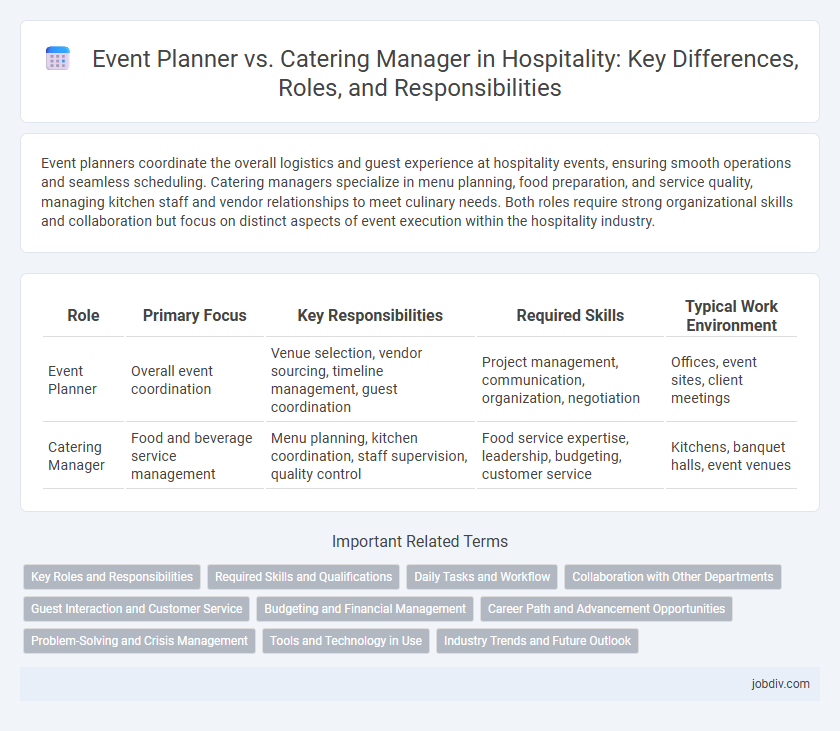Event planners coordinate the overall logistics and guest experience at hospitality events, ensuring smooth operations and seamless scheduling. Catering managers specialize in menu planning, food preparation, and service quality, managing kitchen staff and vendor relationships to meet culinary needs. Both roles require strong organizational skills and collaboration but focus on distinct aspects of event execution within the hospitality industry.
Table of Comparison
| Role | Primary Focus | Key Responsibilities | Required Skills | Typical Work Environment |
|---|---|---|---|---|
| Event Planner | Overall event coordination | Venue selection, vendor sourcing, timeline management, guest coordination | Project management, communication, organization, negotiation | Offices, event sites, client meetings |
| Catering Manager | Food and beverage service management | Menu planning, kitchen coordination, staff supervision, quality control | Food service expertise, leadership, budgeting, customer service | Kitchens, banquet halls, event venues |
Key Roles and Responsibilities
Event planners coordinate all aspects of event logistics, including venue selection, guest accommodations, scheduling, and vendor management to ensure a seamless experience. Catering managers focus on menu planning, food preparation, service quality, and compliance with health regulations to deliver exceptional dining experiences. Both roles require strong organizational and communication skills but serve distinct functions within the hospitality industry.
Required Skills and Qualifications
Event planners must excel in time management, communication, and multitasking, often requiring a degree in hospitality or event management along with experience in vendor coordination and budget oversight. Catering managers need strong leadership abilities, knowledge of food safety regulations, and expertise in menu planning, typically holding certifications like ServSafe and experience in kitchen operations. Both roles demand proficiency in customer service and problem-solving to ensure seamless event execution and client satisfaction.
Daily Tasks and Workflow
Event planners coordinate logistics, client communication, and vendor management to ensure smooth event execution, focusing on timelines, budgets, and guest experience. Catering managers oversee menu planning, food preparation, and service staff coordination, ensuring quality and compliance with health regulations. Both roles require collaboration but differ as event planners manage overall event flow, while catering managers specialize in food service operations.
Collaboration with Other Departments
Event planners coordinate with marketing, sales, and venue operations to ensure seamless event execution, aligning schedules and resources for optimal guest experience. Catering managers collaborate closely with kitchen staff, suppliers, and service teams to synchronize menu planning, food preparation, and service logistics. Both roles require effective interdepartmental communication to deliver successful, well-organized hospitality events.
Guest Interaction and Customer Service
Event Planners play a pivotal role in guest interaction by coordinating schedules, addressing personalized requests, and ensuring a seamless experience throughout the event. Catering Managers concentrate on customer service by managing food quality, coordinating service staff, and addressing dietary needs to enhance guest satisfaction. Both roles require strong communication skills, but Event Planners often engage more directly with guests, while Catering Managers focus on backend service excellence.
Budgeting and Financial Management
Event planners oversee overall budgeting by allocating funds across various event components, ensuring cost-efficiency and adherence to financial constraints. Catering managers focus specifically on controlling food and beverage expenses, negotiating supplier contracts, and minimizing waste to optimize catering budgets. Both roles require precise financial management skills, with event planners managing broader budget frameworks and catering managers concentrating on detailed cost controls within their specialty.
Career Path and Advancement Opportunities
Event Planners often advance by specializing in large-scale corporate or destination events, leveraging project management skills and client relationships to move into senior planning roles or event director positions. Catering Managers typically progress through operational roles, gaining expertise in food service logistics and staff management, leading to opportunities as food and beverage directors or hospitality operations managers. Both career paths offer growth through developing leadership, budgeting, and vendor negotiation expertise within the hospitality industry.
Problem-Solving and Crisis Management
Event planners excel in problem-solving by coordinating logistics and swiftly adapting event schedules to unexpected changes, ensuring seamless client experiences. Catering managers focus on crisis management by handling kitchen emergencies, supply shortages, and staff coordination to maintain food quality and timely service. Both roles require proactive communication and decisive actions to resolve issues that could disrupt hospitality events.
Tools and Technology in Use
Event planners utilize project management software such as Trello, Asana, and social media platforms to coordinate schedules, track tasks, and engage clients, ensuring seamless event execution. Catering managers rely heavily on inventory management systems, POS software like Toast or Square, and kitchen display systems to optimize food preparation, order processing, and cost control. Both roles leverage communication tools like Slack and CRM platforms to enhance collaboration and client relationship management in the hospitality industry.
Industry Trends and Future Outlook
Event planners are increasingly leveraging technology and data analytics to create personalized guest experiences, aligning with trends in digital transformation within the hospitality industry. Catering managers are focusing on sustainability and locally sourced menus to meet growing consumer demand for eco-friendly and health-conscious dining options. Both roles are expected to evolve with rising emphasis on hybrid events and integrated service models that blend event management and catering for seamless execution.
Event Planner vs Catering Manager Infographic

 jobdiv.com
jobdiv.com